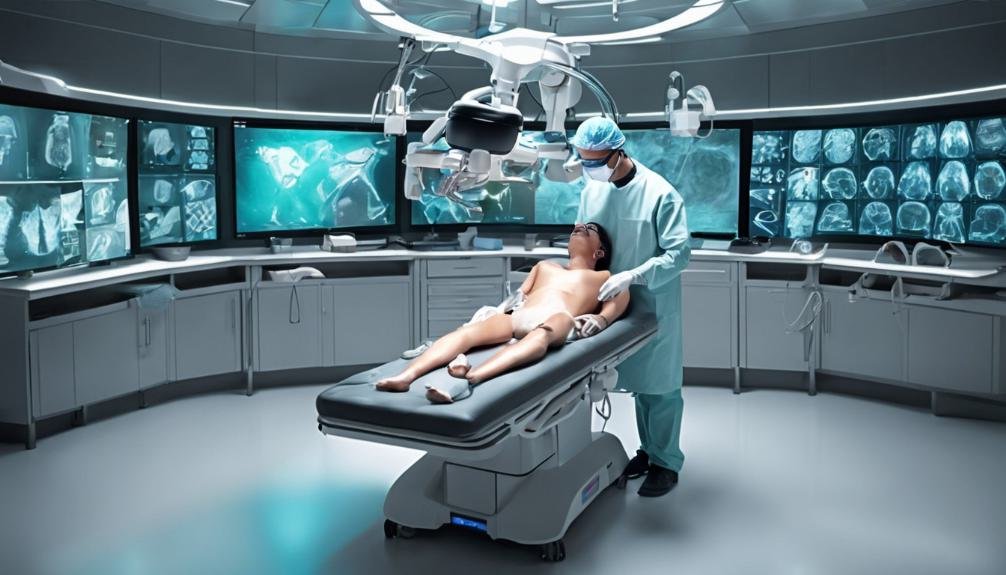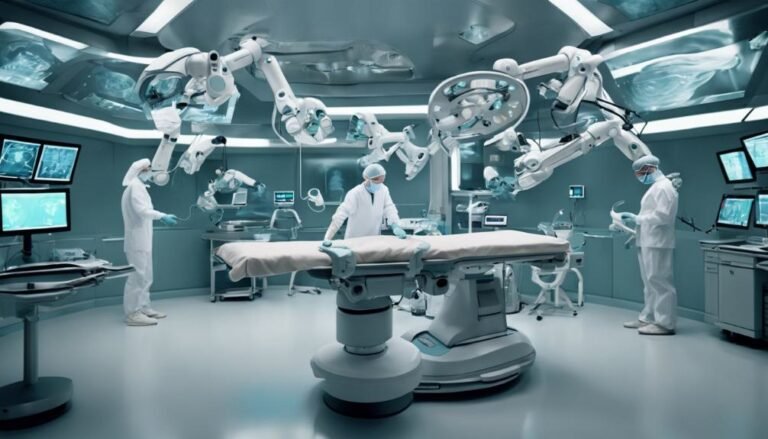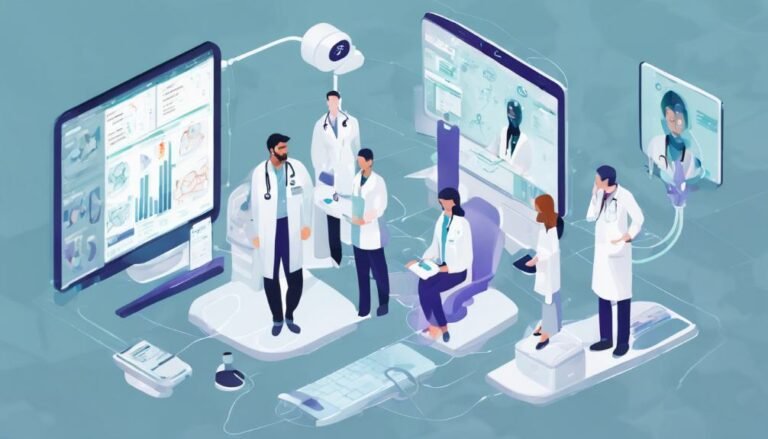AI for Surgical Training
In the field of surgical training, AI is reshaping the landscape by offering innovative solutions that go beyond traditional methods. Imagine a scenario where surgical skills are honed through immersive virtual environments and personalized coaching tailored to individual needs. With AI paving the way for enhanced performance analysis and skill development, the possibilities for revolutionizing surgical education are vast. Stay tuned to uncover how AI is redefining the future of surgical training and shaping the next generation of skilled surgeons.
Key Takeaways
- AI enhances surgical simulations with immersive experiences and real-time monitoring for safe, effective practice.
- Personalized feedback and metrics improve individual skills and offer tailored coaching for proficiency enhancement.
- Real-time performance analysis provides immediate insights, identifies strengths/weaknesses, and generates detailed reports for improvement.
- Virtual reality environments offer realistic skill development with hands-on practice, feedback, and guidance during procedures.
- AI-assisted programs optimize skill development, track progress, and create personalized learning pathways for surgical proficiency training.
Enhancing Surgical Simulations
To enhance surgical simulations, incorporating advanced artificial intelligence algorithms can greatly improve the accuracy and realism of training scenarios. AI-powered simulations are revolutionizing the way surgical skill enhancement is approached by offering immersive training experiences that closely mimic real-world surgical procedures. By integrating cutting-edge technology into simulation platforms, such as virtual reality and haptic feedback systems, trainees can interact with highly realistic surgical scenarios in a controlled environment.
These AI-driven simulations provide a safe space for medical professionals to practice and refine their skills without the risks associated with live surgeries. The technology integration allows for monitoring and tracking of performance metrics in real-time, enabling trainees to receive immediate feedback on their techniques. This personalized approach to surgical training not only enhances skill development but also guarantees that individuals can progress at their own pace, focusing on areas that require improvement.
Through AI-powered simulations, the future of surgical training is evolving towards a more efficient and effective learning experience.
Personalized Feedback and Metrics
You can benefit from customized skill evaluation and accurate performance tracking in your surgical training.
These personalized feedback mechanisms allow for tailored guidance based on your individual progress and areas for improvement.
Customized Skill Evaluation
Customized skill evaluation in the context of AI for surgical training involves the utilization of personalized feedback and metrics to enhance trainee performance. Through individualized coaching, AI algorithms can assess the competency of each trainee accurately. This tailored approach allows for targeted feedback that addresses specific areas for improvement, leading to more effective skill development.
AI systems can analyze a trainee's performance in real-time, providing instant feedback on technique, precision, and overall proficiency. By evaluating key metrics such as hand-eye coordination, instrument handling, and adherence to surgical protocols, AI can offer detailed insights into a trainee's strengths and weaknesses. This data-driven approach enables trainees to track their progress over time, identifying trends and areas needing further focus.
Moreover, customized skill evaluation with AI enhances the overall learning experience by tailoring training programs to individual needs. By combining personalized feedback with objective competency assessment, AI plays a pivotal role in shaping the next generation of skilled surgeons.
Performance Tracking Accuracy
Analyzing performance tracking accuracy through personalized feedback and metrics in AI for surgical training involves precise evaluation of trainee proficiency and skill development. Data accuracy plays an essential role in providing an objective assessment of the trainee's performance during simulated surgeries. By integrating advanced technology, AI can track and analyze various metrics in real-time, ensuring the precision of feedback provided to the trainee.
The feedback precision offered by AI enables trainees to identify specific areas for improvement and track their progress over time accurately. Through detailed performance metrics, trainees can gain insights into their strengths and weaknesses, allowing them to focus their efforts on skill enhancement effectively.
Additionally, AI technology can adapt to individual learning paces and styles, providing personalized feedback tailored to each trainee's needs.
Real-time Performance Analysis
You can benefit from real-time performance analysis in surgical training through instant feedback insights and live skill assessment.
This technology allows for immediate evaluation of your techniques, providing valuable data for improvement.
Instant Feedback Insights
Real-time performance analysis in AI for surgical training provides immediate insights into trainees' skills and areas for improvement. Through feedback analytics and real-time monitoring, trainees receive data-driven insights that enable skill improvement. This instantaneous feedback loop allows for quick identification of strengths and weaknesses in surgical techniques.
By utilizing AI algorithms, the system can track and analyze a trainee's movements and decision-making processes in real-time. This data is then processed to generate detailed reports on performance metrics such as accuracy, speed, and precision. Trainees can access these insights immediately after a training session, allowing for timely reflection and adjustment of their approach.
With the ability to pinpoint specific areas that require enhancement, trainees can focus their efforts on targeted skill development. The data-driven insights provided by real-time performance analysis in AI for surgical training serve as a valuable tool in guiding trainees towards proficiency and mastery in surgical procedures.
Live Skill Assessment
Conducting live skill assessments during surgical training sessions provides immediate feedback on trainees' performance. This real-time performance analysis is essential for enhancing surgical skills and ensuring trainees progress effectively.
Through remote monitoring tools and AI technology, trainers can observe and evaluate trainees' actions as they perform various procedures. These assessments allow for instant identification of areas needing improvement, enabling trainers to provide targeted feedback and guidance promptly.
Live skill assessment not only benefits trainees but also contributes to overall patient safety by ensuring that surgeons are adequately trained and competent. By analyzing trainees' actions in real-time, trainers can pinpoint specific areas where skill enhancement is necessary, leading to more focused training interventions.
Utilizing live skill assessments in surgical training sessions fosters a proactive approach to skill improvement. Trainees receive immediate feedback on their performance, allowing them to make necessary adjustments promptly. Through remote monitoring and real-time analysis, trainers can track progress, tailor training programs, and ultimately enhance the overall quality of surgical education.
Virtual Reality Training Environments
Utilizing advanced virtual reality environments, AI-powered surgical training programs offer an immersive and realistic platform for trainees to hone their skills with unprecedented precision. These environments provide immersive experiences that replicate real-life surgical scenarios, allowing trainees to engage in interactive learning. Through simulated surgeries, trainees can gain hands-on practice in a controlled and risk-free setting, where they can make mistakes and learn from them without jeopardizing patient safety.
Virtual reality training environments enable trainees to develop their surgical skills by performing procedures in a realistic 3D space, where they can manipulate virtual instruments and interact with anatomical structures. This hands-on experience enhances muscle memory, hand-eye coordination, and spatial awareness, all essential for surgical proficiency. Trainees can also receive real-time feedback and guidance from AI algorithms, helping them improve their techniques and decision-making during procedures.
AI-assisted Skill Development
Enhance your surgical skills through AI-assisted training programs designed to optimize skill development and proficiency. Skill enhancement is at the forefront of modern surgical training, with AI algorithms playing an essential role in shaping the future of medical education.
By integrating advanced technology into surgical proficiency training, AI can analyze your performance, provide real-time feedback, and tailor training programs to your specific needs.
AI algorithms can track your progress, identify areas for improvement, and create personalized learning pathways to enhance your skills efficiently. Through continuous interaction with AI systems, you can refine your techniques, improve decision-making processes, and ultimately elevate your surgical competence.
The integration of AI technology in skill development not only offers precise feedback but also enables you to practice in a simulated environment that closely mimics real surgical scenarios.
Accessible Training Solutions
Accessible training solutions can revolutionize surgical education by providing flexible learning opportunities tailored to individual needs. Through remote learning platforms, surgeons can access interactive modules that simulate surgical procedures, allowing for practice in a controlled environment. These modules offer real-time feedback, enabling learners to track their progress and identify areas for improvement.
Remote learning also facilitates access to expert instructors from around the world, who can provide personalized guidance and mentorship. This global network of educators enhances the learning experience by offering diverse perspectives and insights.
Moreover, interactive modules allow for hands-on practice without the constraints of traditional classroom settings. Learners can engage in simulated surgeries at their own pace, reinforcing skills and building confidence in a risk-free environment.
Future of Surgical Education
Innovations in artificial intelligence (AI) are reshaping the landscape of surgical education, paving the way for more advanced and personalized learning experiences.
The future of surgical education is moving towards remote learning through interactive platforms that allow surgical trainees to access high-quality educational materials from anywhere in the world. These interactive platforms enable learners to engage with virtual surgical procedures, receive real-time feedback, and collaborate with experts in the field.
Additionally, the future of surgical education will incorporate gamified training to provide immersive experiences for trainees. By integrating gamification elements such as challenges, rewards, and simulations, surgical education can become more engaging and effective.
Immersive experiences through virtual reality (VR) and augmented reality (AR) technologies will allow trainees to practice surgical techniques in a realistic and risk-free environment.
Conclusion
Incorporating AI into surgical training enhances simulations, provides personalized feedback, and offers real-time performance analysis.
With virtual reality environments and AI-assisted skill development, trainees can optimize their proficiency and improve their hand-eye coordination.
The future of surgical education is evolving towards accessible, flexible, and interactive training solutions that cater to the needs of aspiring surgeons worldwide.
AI is revolutionizing surgical training, shaping the future of the healthcare industry with innovative advancements.







